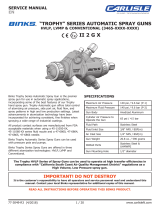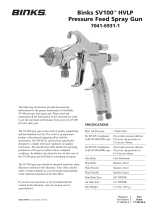
4. AIR SUPPLY
Recommended supply system see fig.2.
4.1. Ensure that the spray gun trigger is in the “off” position before
connecting to the air supply.
4.2. You will require an air pressure between 40 - 60psi, and an air
flow according to the specification.
WARNING! Ensure that the air supply is clean and does not
exceed 60psi while operating the spray gun. Too high an air pressure
and/or unclean air will shorten the product life, due to excessive
wear, and may cause damage and/or personal injury.
4.3. Drain the air tank daily. Water in the air line will damage the
spray gun and invalidate your warranty.
4.4. Clean compressor air inlet filter weekly.
4.5. Line pressure should be increased to compensate for unusually long air hoses (over 8 metres). The minimum hose diameter should be
1/4” I.D. and fittings must have the same inside dimensions.
4.6. Keep hose away from heat, oil and sharp edges.
4.7. Check hoses for wear, and make certain that all connections are secure.
5. OPERATION
5.1. For best results, handle the gun correctly. It should be held perpendicular to the surface
being sprayed and moved parallel to it. Start the stroke before squeezing the trigger and
release the trigger before finishing the stroke. This will give more accurate control of
the gun and the material fig.3.
5.2. Spray from a distance of 6 (150mm) to 10 inches (250mm), depending on the material
and the atomizing pressure. The material deposited should always be even and wet.
Each stroke must overlap the preceding stroke to obtain a uniform finish. To reduce
over spray and obtain maximum efficiency, spray with the lowest possible atomizing
air pressure.
5.3. Controlling the fluid and the fan spray:
a) As the width of the spray is altered so the fluid flow must be adjusted to maintain
the same coverage. Use the fluid control screw (‘C’ in Section 6).
b) The direction of the fan spray, either horizontal or vertical, is adjusted by turning
the air cap to the desired position and then tightening the retaining ring
6. CLEANING/MAINTENANCE
WARNING! Disconnect from the air supply before attempting any maintenance or cleaning. When reassembling after maintenance,
be sure to take care when screwing parts together. At first screw parts hand tight to avoid cross-threading. If a part cannot easily
be turned by hand, check that you have the correct part, or unscrew, realign and try again. DO NOT use excessive force when
reassembling.
6.1. Spray gun
6.1.1. Immerse the front end of the gun only in solvent until the solvent just covers the fluid connection.
6.1.2. Use a bristle brush and solvent to wash off accumulated paint.
6.1.3. DO NOT immerse the entire gun in solvent. This will cause lubricants to dissolve and packing to
dry out. Dirty solvent may also clog the narrow passages in the gun.
6.1.4. Wipe the outside of the gun with a dampened solvent rag.
6.1.5. Lubricate the gun daily with a light machine oil. Be sure to lubricate the fluid needle packing,
air valve packing, side port control packing and trigger pivot point. Do not use lubricants
containing silicone.
6.1.6. When finished spraying, flush the gun through with clean thinners.
6.2. Air nozzle, fluid nozzle & needle assembly.
6.2.1. To clean the nozzles, soak them in solvent to dissolve any dried material then blow them clean
with air.
6.2.2. Handle all nozzles carefully and do not make any alterations in the gun.
6.2.3. If you need to probe the holes in the nozzles, be sure to use a tool that is softer than brass; do not use metal instruments.
6.2.4. Adjust the fluid needle valve so that when the gun is triggered, air flow occurs before fluid flow.
Original Language Version
© Jack Sealey Limited
g.3
g.4
g.2
SSG1P/1.V3 Issue 1 11/10/21









